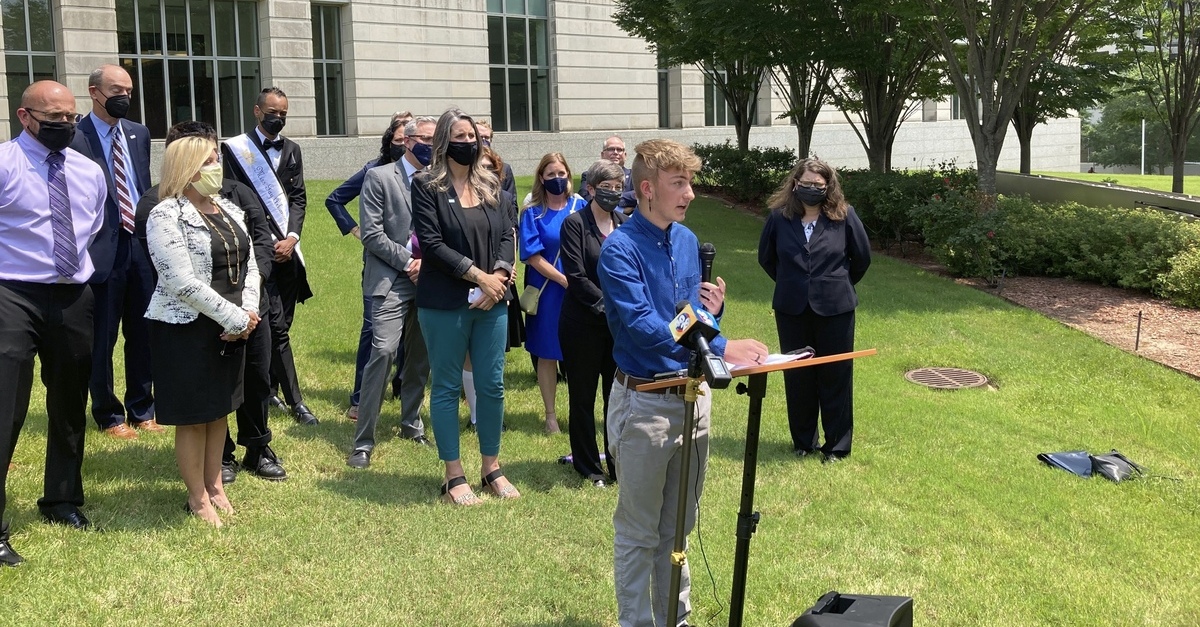
Dylan Brandt, one of the named plaintiffs in the lawsuit challenging Arkansas’ ban on gender-affirming medical care for transgender youth, speaks at a news conference outside the federal courthouse in Little Rock, Ark., on Wednesday, July 21, 2021. (AP Photo/Andrew DeMillo, File)
A federal judge permanently blocked the controversial Arkansas statute that banned gender-affirming medical care for transgender youth Tuesday, making the Bear State the first to issue a merits ruling on such a law.
U.S. District Judge Jay Moody issued a permanent injunction against the law that would have prohibited doctors from providing gender-affirming hormone treatment, puberty blockers, or surgery to anyone under 18 years old. Arkansas’ novel law was passed after the state’s Republican lawmakers overrode fellow Republican Gov. Asa Hutchinson’s veto in 2021.
“Rather than protecting children or safeguarding medical ethics, the evidence showed that the prohibited medical care improves the mental health and well-being of patients and that, by prohibiting it, the state undermined the interests it claims to be advancing,” Moody, a Barack Obama appointee, wrote in the first-of-its-kind ruling.
Over the course of 80 pages, Moody systematically dismantled Arkansas’ arguments and found that none of the state’s expert witnesses or related evidence held up in court.
In his ruling against Arkansas, Moody first cataloged the qualifications of the ACLU’s medical experts, listing their extensive experience treating patients with gender dysphoria, their medical education and experience conducting scientific research, and their respective high-profile positions in various well-respected medical institutions.
Moody summed up the court’s take on these experts:
Plaintiffs’ experts’ extensive experience, their testimony in court, and their demeanor and responsiveness to questions asked by both sides and the Court, show that all four of Plaintiffs’ expert witnesses have deep knowledge of the subject matter of their testimony and were fully qualified to provide the opinion testimony they offered. They have provided credible and reliable testimony relevant to core issues in this case.
In stark contrast, Moody said that most of Arkansas’ witnesses had been hand-picked and trained by conservative advocacy group Alliance Defending Freedom to testify in favor of transgender healthcare bans — despite their utter lack of training, experience, or credibility.
“The ADF is not a scientific organization, but a Christian-based legal advocacy group,” Moody noted.
The judge wrote that Arkansas’ witnesses were “unqualified” as experts and “offered unreliable testimony” which had been “grounded in ideology rather than science.”
Moody said that only one of Arkansas’ witnesses — Dr. Stephen Levine — had any actual experience treating patients with gender dysphoria, but that Levine gave entirely unreliable evidence and that Levine “struggles with the conflict between his scientific understanding for the need for transgender care and his faith.”
Levine testified that gender clinics “encourage patients to identify as transgender” and provide hormones “immediately without assessing patients.” He also said that doctors take such steps without addressing patients’ other mental health conditions or informing teens or parents about related risks of treatment. Despite Levine’s dire warnings, though, Moody said Levine offered no evidence that his accusations were true and even admitted that he had no knowledge about how gender clinics provide care.
Moody also dismissed the testimony of Arkansas’ other expert witness, Mark Regnerus, who lacked any training or experience in healthcare. In a footnote, Moody mentioned that this was not the first time that Regnerus’s testimony was rejected by a court. In another case, Regnerus testified that “gay parenting caused adverse outcomes in children,” and the court found his opinion to be a “fringe viewpoint” that was “entirely unbelievable and not worthy of serious consideration.”
Turning to the two doctors the state used as expert witnesses, endocrinologist Paul W. Hruz and plastic surgeon Patrick W. Lappert, the judge noted that neither had actually treated patients with gender dysphoria.
Moody said that Regnerus, Hruz, and Lappert “were testifying more from a religious doctrinal standpoint rather than that required of experts by Daubert.”
The judge had been referring to the “Daubert standard,” a legal concept stemming from the case of Daubert v. Merrell Dow Pharmeceuticals, which requires that admissible expert opinion testimony be based upon sufficient facts, data, and scientific principles.
Read Related Also: Andrew Tate 'categorically denies' claims made by four British women
Moody declined to take Hruz’s suggestion that the court should reject the ACLU’s evidence as “low-quality research,” and instead found that the evidentiary value of studies supporting gender-affirming medical care “is comparable to the quality of evidence supporting many other medical treatments minors and their families may pursue.”
“The body of research, taken as a whole, shows these treatments provide significant benefits to adolescents with gender dysphoria,” concluded Moody.
Moody was also wholly unreceptive to either the purported facts or legal arguments Arkansas put forth in the case. Specifically, the judge found that there was no evidence to support the state’s claims that doctors negligently prescribe puberty blockers to minors or that they treat patients with gender dysphoria without mental health support.
Arkansas had argued that its ban was necessary to protect children from what it described as dangerous and politically-motivated treatment disguised as medical care, despite widespread support for gender-affirming care within the medical community. Moody rejected that contention.
“To accept this claim would require the Court to both credit Professor Regnerus’ testimony and the notion that every major medical association in the United States is driven by ideology rather than science and patient well-being,” the judge wrote in a footnote. “There is no basis and no evidence supporting such a conspiratorial assessment of all the major medical associations.”
Moody ruled that a ban against transgender healthcare violates the First Amendment and both the Equal Protection and Due Process clauses of the U.S. Constitution. Importantly, Moody advocated for the treatment of transgender people under the law as a “suspect class, meaning that laws potentially affecting their rights would be subject to strict scrutiny — the highest standard of review.
The judge noted that “transgender people satisfy all indicia of a suspect class,” including having historically been subject to discrimination, having a “defining characteristic” unrelated to their ability to “contribute to society,” being defined by their “obvious, immutable, or distinguishing characteristics,” and being a minority group “lacking political power.”
However, as Moody noted, even if laws affecting transgender people are not subject to the highest level of scrutiny, precedent mandates at least a heightened standard based on gender discrimination.
Transgender teens who would have been barred from receiving care under the law expressed relief and gratitude following the ruling.
“I’m so grateful the judge heard my experience of how this health care has changed my life for the better and saw the dangerous impact this law could have on my life and that of countless other transgender people,” said Dylan Brandt, the 17-year-old transgender plaintiff in the lawsuit
“My mom and I wanted to fight this law not just to protect my health care, but also to ensure that transgender people like me can safely and fully live our truths,” Dylan added. “Transgender kids across the country are having their own futures threatened by laws like this one, and it’s up to all of us to speak out, fight back, and give them hope.”
“We’re relieved and grateful that the court has ruled in favor of these brave Arkansans and their rights, protecting life-saving care that should be available to all trans youth,” said Holly Dickson, Executive Director of the ACLU of Arkansas. “This decision sends a clear message. Fear-mongering and misinformation about this health care do not hold up to scrutiny; it hurts trans youth and must end. Science, medicine, and law are clear: gender-affirming care is necessary to ensure these young Arkansans can thrive and be healthy.”
Chase Strangio, Deputy Director for Transgender Justice at the ACLU’s LGBTQ & HIV Project, called the ruling “an enormous relief to transgender youth and their families across Arkansas and across the country.”
The Arkansas law — ominously named the Save Adolescents from Experimentation (SAFE) Act — which barred the use of state funds or insurance coverage for gender-affirming healthcare for transgender people under age 18, was challenged by the ACLU on behalf of four families of transgender youth and two doctors.
A trial lasting several weeks was held in the fall of 2022, and Judge Moody’s lengthy opinion was the first ruling on the merits in such a case. Other federal courts have blocked similar laws in Alabama, Florida, and Indiana via preliminary injunction.
Have a tip we should know? [email protected]








